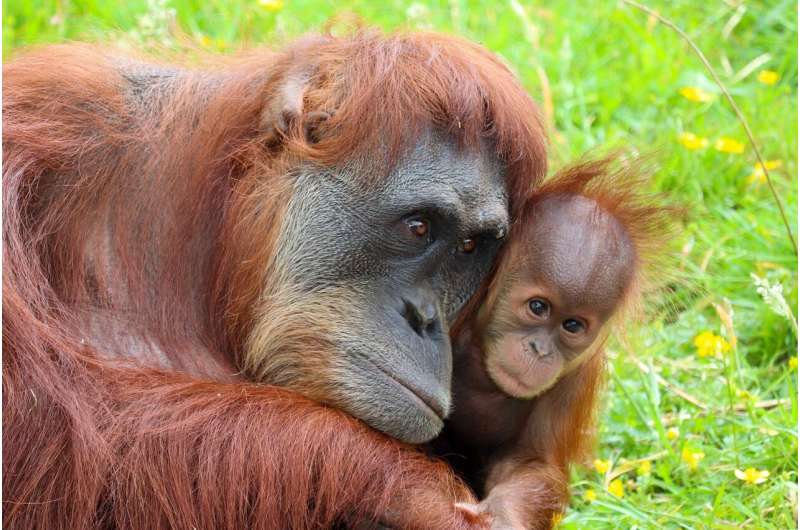This article has been reviewed according to Science X's editorial process and policies. Editors have highlighted the following attributes while ensuring the content's credibility:
fact-checked
trusted source
written by researcher(s)
proofread
Orangutan diplomacy: Why Malaysia's scheme is attracting criticism before it starts

Malaysia plans to gift orangutans to major economic partners, as a way of improving its international image and building alliances. The "orangutan diplomacy" plan was confirmed by the nation's plantation and commodities minister, Johari Abdul Ghani, at a biodiversity conference in early May.
Malaysia made the controversial announcement days after the European Union, one of Malaysia's biggest palm oil importers, agreed to ban agricultural imports that cultivate crops on lands that were deforested after 2020. Firms wishing to export to the EU would now need to provide proof, such as satellite images, that crops were not grown in such conditions. This could hit Malaysia's palm oil industry, which has been accused of destroying the forest habitats of endangered species, including the orangutan.
Without adopting a comprehensive conservation plan for the animals, Malaysia risks international condemnation that it is gifting orangutans as a reward to major palm oil importers. This could undermine the program as well as the nation's image.
In Malay and Indonesian, orangutan means "person of the forest." These great apes are found only in Malaysia and Indonesia. They have reddish fur, long arms, cheek pads, and, just like China's giant pandas, opposable thumbs. They have human-like intelligence and have been known to employ herbal medicine to heal their wounds, communicate and use sign language.
Unfortunately, orangutan numbers are dwindling. The WWF (formerly the World Wide Fund for Nature) states that there were more than 230,000 orangutans 100 years ago. But the current population is less than half that figure, and the primates are critically endangered. Undoubtedly, poaching and the illegal animal trade are partly responsible. However, the biggest culprit appears to be palm oil-induced deforestation where swaths of forest land, which contain orangutan habitats, make way for palm oil plantations.
The plan to send orangutans to major palm oil importers is already controversial. Stuart Pimm, a conservation ecologist from Duke University in the US, described orangutan diplomacy as "obscene" and "repugnant," while emphasizing that unlike China's giant pandas, orangutans do not have established state-of-the-art facilities and protected areas in their homeland.
Malaysia is economically dependent on palm oil. Five percent of the country's 2022 GDP came from the sector, while palm oil exports are also a major source of Malaysia's foreign exchange earnings. Palm oil is a highly versatile and cost-effective commodity. It is used to make cooking oil, lipstick, shampoo, detergent, soap, cookies, chocolate and many other everyday products.
Johari concedes that his idea of Malaysia gifting orangutans to major palm oil importing nations is a diplomatic strategy to convince economic partners that Malaysia is committed to developing its economy while preserving wildlife. Malaysia also clearly wants to try and offset the bad publicity for palm oil and its industrial policy.
The history of panda diplomacy
The idea for orangutan diplomacy is inspired by the success of China's panda diplomacy project. Legend has it that panda diplomacy began during the ancient Tang Dynasty (618–907), but only took off after US president Richard and first lady Pat Nixon paid an official visit to China in February 1972.
Two months later, Ling-Ling and Hsing-Hsing arrived at the National Zoo in Washington DC. Within a year of their arrival, the pandas attracted more than 1.1. million visitors, and were the zoo's star attractions for years.
As a soft power tool, panda diplomacy has been designed to build alliances with other nations. The program moved towards becoming a conservation program in the early 1990s, and Beijing has sent dozens of its bears to key partners across the world.
There are three main elements that make panda diplomacy a success. One, the pandas have visual appeal. Giant pandas have what experts call kindchenschema, a clumsy and childlike set of characteristics that evokes empathy and sense of protection from humans.
Two, pandas are exclusively found in China. When foreign citizens see pandas as adorable, friendly and peaceful, they associate them with China exclusively.
Three, the initiative is tied to a high-profile conservation program. While people have criticized the political aspects of panda diplomacy, the conservation component has won over critics. According to International Union for Conservation of Nature, giant pandas are no longer endangered, and panda diplomacy has played a crucial role in this.
Could an orangutan diplomacy program follow the same path? Orangutans have unique physical attributes and appeal, but there are major points of difference.
For one, the Chinese government loans, rather than gifts, pandas to strategic allies, and did not appear to roll out panda diplomacy due to pressure from external factors. More importantly, China has worked closely with conservation groups, such as the WWF, to set up green corridors for pandas, and has won accolades from conservation bodies.
In the end, Kuala Lumpur needs to be honest with itself: can orangutan diplomacy reverse the misfortunes that may befall palm oil exports from Malaysia? It's not likely.
If forest management, conservation of wildlife, and the sustainability of palm oil production are concerning trading partners like Europe, then it may best if the Malaysian government addresses these issues before contemplating its own version of animal diplomacy. As it stands, orangutan diplomacy is looking more like a public relations disaster waiting to happen.
Provided by The Conversation
This article is republished from The Conversation under a Creative Commons license. Read the original article.![]()





















